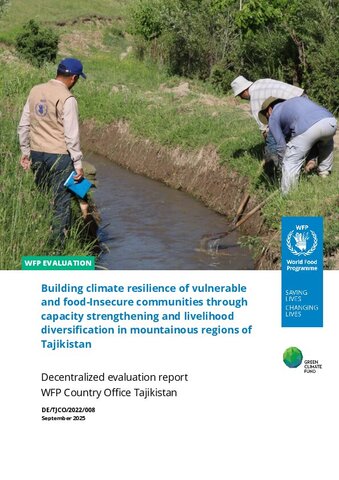
This decentralized evaluation was commissioned by the Tajikistan Country Office as the final evaluation of the Green Climate Fund (GCF) -financed project “Building climate resilience of vulnerable and food-insecure communities through capacity strengthening and livelihood diversification in mountainous regions of Tajikistan (2020–2025).”
The evaluation served both accountability and learning purposes. The evaluation assessed relevance, coherence, efficiency, effectiveness, impact, sustainability, gender and equity, country ownership, innovation, replicability, and scalability based on OECD-DAC and GCF evaluation criteria.
Key evaluation findings included:
- Relevance: The project was highly relevant to the needs of climate-vulnerable and food-insecure communities and well aligned with national adaptation strategies and WFP priorities; addressed climate information, water access, food security, and gender-responsive needs. The project’s flexible design adapted to evolving context.
- Coherence: The project was internally coherent between climate services and community adaptation components, but weak external coordination with UN agencies and donors limited synergies.
- Efficiency: The project maintained effective financial management and strategic use of co-financing. However, delays in approval, procurement, disbursement, procurement, and administrative processes, resulting in a compressed timelines reduced implementation efficiency.
- Effectiveness: The project largely achieved its intended results, showing strong transformative potential at both institutional and community levels. It strengthened climate information systems through Hydromet capacity building, ICT rollout, and participatory tools like PICSA, while integrating adaptation priorities into district development plans and promoting awareness and training across sectors. At the community level, investments in agroforestry, irrigation, renewable energy, and bundled support for women-headed households improved productivity, food security, and empowerment. However, digital access barriers, uneven institutional engagement, and technical limitations in asset delivery constrained sustainability, leaving long-term impact dependent on continued institutional support and targeted follow-up.
- Gender integration: was strong, with targeted support to women-headed households improving income, food security, and energy efficiency through assets like greenhouses and solar technologies combined with training. However, structural changes such as access to credit or land ownership were beyond scope, and digital barriers limited collective agency. The project lacked disability inclusion strategies or data, constraining equity outcomes.
- Sustainability & Country Ownership: The project’s sustainability prospects were moderate, supported by improved infrastructure, institutional engagement, and integration into district plans, as well as community ownership through participatory planning and maintenance agreements. However, risks remain due to the absence of a formal sustainability strategy, limited financing options for beneficiaries, and capacity gaps within institutions. Country ownership was promoted through policy alignment and partnerships, but coordination challenges weakened national-level ownership. Community input was largely consultative than influential.
- Impact: The project improved land and water management, productivity, income diversification, and food security through climate services and solar technologies. Women-headed households saw better livelihoods. However, the project did not have wider knock-on effects on communities, and lack of greenhouse gas accounting prevented mitigation measurement.
- Consolidate and scale tested intervention models through modular and standardized delivery packages.
- Strengthen institutional anchoring and operational sustainability of climate information services through tailored technical assistance and decentralized service delivery models.
- Continue to strengthen inclusion and women's empowerment by building practical, context-specific mechanisms for participation, follow-up, and access to resources.
- Embed proactive risk management, sustainability planning and institutional handover strategies from the outset.
Key recommendations from the evaluation included:
- Consolidate and scale tested intervention models through modular and standardized delivery packages.
- Strengthen institutional anchoring and operational sustainability of climate information services through tailored technical assistance and decentralized service delivery models.
- Continue to strengthen inclusion and women's empowerment by building practical, context-specific mechanisms for participation, follow-up, and access to resources.
- Embed proactive risk management, sustainability planning and institutional handover strategies from the outset.
